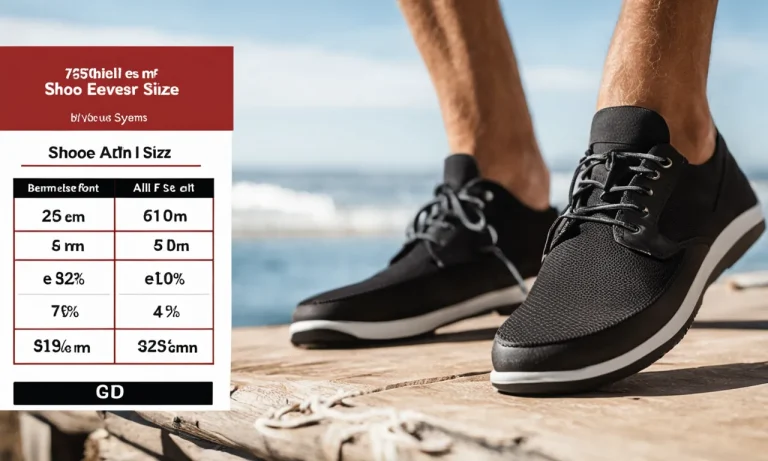Shoes are essential items that we all need, which means starting an online shoe business can be a lucrative opportunity if you get it right. With some careful planning and effort, you can launch your own successful online shoe store.
If you’re short on time, here’s a quick answer: To start a shoe business online, you need to research the market, choose a business structure, obtain necessary licenses and permits, find shoe suppliers, build an ecommerce website, market your business online, manage inventory efficiently, offer excellent customer service, and optimize the business for growth over time.
In this comprehensive guide, we’ll go through all the key steps and considerations for starting a profitable shoe business online.
Conduct Thorough Market Research
Before starting a shoe business online, it is crucial to conduct thorough market research. This will help you understand the industry landscape and make informed decisions to set your business up for success. Here are some key steps to consider:
Analyze the competition
Take the time to study your competitors. Look at their online presence, product offerings, pricing strategies, and customer reviews. This will give you valuable insights into what works well in the market and help you identify areas where you can differentiate yourself.
Identify your target audience and their needs
Understanding your target audience is essential for any business. Identify who your potential customers are, what their preferences and needs are, and how your shoe business can provide value to them. This will enable you to tailor your products, marketing messages, and overall brand experience to attract and retain customers.
Determine your shoe niche
One way to stand out in the crowded online shoe market is to specialize in a specific niche. Consider focusing on a particular style, target demographic, or even a specific type of shoe. By narrowing down your niche, you can better cater to the needs and preferences of your target audience and establish yourself as an expert in that area.
Validate the demand
Before investing time and resources into starting a shoe business online, it is essential to validate the demand for your products. Conduct surveys, analyze search trends, and gather feedback from potential customers to ensure that there is sufficient market demand for your shoe offerings.
This will help you avoid entering a saturated market or launching products with little demand.
Remember, market research is an ongoing process. Stay updated on industry trends, consumer preferences, and competitor activities to adapt your business strategies accordingly. By conducting thorough market research, you can gain a competitive edge and increase your chances of success in the online shoe business.
Choose a Business Structure
When starting a shoe business online, one of the first decisions you will need to make is choosing the right business structure. The business structure you choose will determine important factors such as how your business is taxed, your personal liability, and the level of control you have over the business.
Here are some common business structures to consider:
Sole proprietorship
A sole proprietorship is the simplest and most common form of business structure. It is a business owned and operated by a single individual. In this structure, the owner assumes all liability for the business and its debts.
This option is popular among small business owners due to its simplicity and low startup costs. However, it offers no legal separation between the business and the owner, meaning that personal assets may be at risk in the event of a lawsuit or bankruptcy.
Partnership
A partnership involves two or more individuals who share ownership and responsibilities of the business. Partnerships can be general partnerships, where all partners have equal control and liability, or limited partnerships, where there are both general partners and limited partners.
In a partnership, the partners share profits, losses, and decision-making. It is important to have a well-drafted partnership agreement to outline the roles, responsibilities, and rights of each partner.
Limited Liability Company (LLC)
An LLC is a popular choice for many small businesses. It provides the limited liability protection of a corporation while offering the flexibility and tax benefits of a partnership. In an LLC, the owners are called members, and their personal assets are protected from the company’s liabilities.
This structure also allows for pass-through taxation, where profits and losses are reported on the members’ individual tax returns. Forming an LLC typically requires filing articles of organization with the state and creating an operating agreement.
Corporation
A corporation is a separate legal entity from its owners, known as shareholders. It offers the highest level of personal liability protection, as the shareholders’ personal assets are generally not at risk.
Corporations have a more complex structure, requiring the formation of a board of directors, officers, and shareholders. They are subject to more regulations and formalities, such as holding annual meetings and maintaining detailed financial records.
Corporations can be either C corporations, which are subject to double taxation, or S corporations, which have pass-through taxation.
It is important to consider the advantages and disadvantages of each business structure and choose the one that best aligns with your goals and needs. Consulting with a business attorney or accountant is recommended to ensure that you make an informed decision.
Obtain Necessary Licenses and Permits
Starting a shoe business online requires you to obtain certain licenses and permits to ensure that you are operating legally and within the regulations of your jurisdiction. Here are some important licenses and permits to consider:
Business license
A business license is a basic requirement for any type of business, including an online shoe business. This license allows you to legally operate your business and ensures that you are in compliance with local laws and regulations.
The process for obtaining a business license may vary depending on your location, so it’s important to research the specific requirements for your area. You can contact your local government office or visit their website for more information on how to apply for a business license.
Sales tax permit
If you plan on selling shoes online, you will likely need a sales tax permit. This permit allows you to collect sales tax from your customers and remit it to the appropriate tax authorities. The requirements for obtaining a sales tax permit vary by state, so be sure to check with your state’s department of revenue or taxation for specific instructions.
It’s important to note that if you sell shoes to customers in multiple states, you may be required to obtain sales tax permits in each state.
Seller’s permit
In addition to a sales tax permit, you may also need a seller’s permit. A seller’s permit, also known as a resale certificate or reseller’s permit, allows you to purchase shoes from wholesalers or manufacturers without paying sales tax.
This permit is typically required if you plan on buying shoes in bulk or reselling them. The requirements for obtaining a seller’s permit vary by state, so be sure to check with your state’s department of revenue or taxation for specific instructions.
It’s important to keep in mind that the licensing and permitting requirements for starting a shoe business online may vary depending on your location and the specific nature of your business. It’s always a good idea to consult with a legal professional or small business advisor to ensure that you are in compliance with all applicable laws and regulations.
Find Reliable Shoe Suppliers
One of the crucial steps in starting a shoe business online is finding reliable shoe suppliers. Having a trustworthy supplier is essential to ensure the quality and timely delivery of your products. Here are some options for finding reliable shoe suppliers:
Domestic Suppliers
Working with domestic suppliers can have several advantages. Firstly, you can establish a closer relationship and communicate more effectively due to the same language and time zone. Additionally, shipping and delivery times are generally faster when working with domestic suppliers.
You can find reliable domestic shoe suppliers by attending trade shows, contacting shoe manufacturers directly, or researching online directories.
Overseas Suppliers
Overseas suppliers can offer a wider range of shoe styles and lower production costs. Countries like China, India, and Brazil are known for their shoe manufacturing capabilities. However, when working with overseas suppliers, it’s important to consider factors such as language barriers, longer shipping times, and potential customs and import duties.
To find overseas suppliers, you can attend international trade shows, use online sourcing platforms, or hire a sourcing agent to help you connect with reliable manufacturers.
Dropshipping
If you want to minimize the upfront investment and inventory management, dropshipping can be a viable option. Dropshipping allows you to sell shoes without physically stocking them. Instead, when you receive an order, you simply contact the supplier who will then ship the product directly to the customer.
This eliminates the need for storage space and reduces the risk of unsold inventory. You can find dropshipping suppliers through online directories, platforms like Shopify, or by reaching out to shoe brands that offer dropshipping programs.
It’s important to thoroughly research and vet potential suppliers before making any commitments. Check their reputation, read reviews, and request samples to ensure the quality meets your standards. Building strong relationships with reliable suppliers is key to the success of your online shoe business.
Build an Ecommerce Website
Starting a shoe business online requires a well-designed and user-friendly ecommerce website. This is where customers will browse and purchase your products. Here are some important steps to help you build an effective online store:
Choose a domain name
The first step is to choose a domain name for your online shoe business. A domain name is the web address that customers will use to access your website. It should be easy to remember, relevant to your business, and preferably include keywords related to shoes.
Consider using a domain registrar service to search for available domain names and register the one that best represents your brand.
Select an ecommerce platform
Next, you need to select an ecommerce platform that suits your business needs. There are various platforms available, such as Shopify, WooCommerce, and Magento, each with its own features and pricing plans.
Research and compare these platforms to find the one that offers the right balance of functionality, ease of use, and affordability for your shoe business.
Design an attractive site
The design of your ecommerce website plays a crucial role in attracting and retaining customers. It should be visually appealing, easy to navigate, and showcase your shoe products effectively. Consider hiring a professional web designer or using pre-designed templates offered by ecommerce platforms to create a visually stunning and user-friendly website.
Remember to incorporate your brand elements, such as your logo and color scheme, to maintain consistency across your online presence.
Optimize for conversions
When building your ecommerce website, it is essential to optimize it for conversions. This involves implementing strategies to encourage visitors to make a purchase. Some techniques include clear and persuasive product descriptions, high-quality product images, easy-to-use shopping carts, and a streamlined checkout process.
Additionally, consider implementing search engine optimization (SEO) techniques to improve your website’s visibility in search engine results and attract organic traffic.
By following these steps and investing time and effort into building a well-designed and user-friendly ecommerce website, you can lay a strong foundation for your online shoe business and increase your chances of success.
Market Your Online Shoe Store
Once you have set up your online shoe store, it’s time to start marketing it to potential customers. Effective marketing strategies can help you increase your online visibility and drive traffic to your website. Here are some key methods to consider:
1. SEO
Search Engine Optimization (SEO) is crucial for improving your website’s visibility on search engines like Google. By optimizing your website’s content and structure, you can increase your chances of appearing higher in search engine rankings.
This means potential customers are more likely to find your online shoe store when searching for shoes online. Make sure to use relevant keywords, create compelling meta descriptions, and optimize your website’s loading speed.
2. Social media marketing
Social media platforms like Facebook, Instagram, and Twitter provide a great opportunity to connect with your target audience and promote your online shoe business. Create engaging and visually appealing content, including high-quality images and videos of your shoe collection.
Interact with your followers, run targeted ads, and collaborate with influencers to expand your reach. Social media platforms also offer analytics tools that can help you track the effectiveness of your marketing campaigns.
3. Email marketing
Building an email list of interested customers is a valuable asset for your online shoe business. Send out regular newsletters and promotional emails to keep your audience updated on new arrivals, discounts, and special offers.
Personalize your emails and segment your audience to ensure you are sending relevant content to the right people. Consider offering exclusive discounts or incentives to encourage customer loyalty and repeat purchases.
4. Influencer marketing
Collaborating with influencers in the fashion and shoe industry can help you reach a wider audience and generate brand awareness. Look for influencers who align with your brand values and have a significant following.
They can feature your shoes in their posts, create sponsored content, or even host giveaways. Influencer marketing can be a powerful tool to establish credibility, increase brand visibility, and drive traffic to your online shoe store.
Remember, marketing your online shoe store is an ongoing process. Continuously analyze your marketing efforts, monitor your website’s performance, and make adjustments as needed. By implementing these strategies effectively, you can attract more customers and grow your online shoe business.
Manage Inventory Efficiently
One of the key factors to running a successful online shoe business is managing inventory efficiently. This involves accurately forecasting demand, tracking inventory, and managing stock levels. By implementing effective inventory management strategies, you can ensure that you always have the right shoes in stock to meet customer demand, minimize waste, and maximize profitability.
Forecasting demand
A crucial aspect of managing inventory efficiently is accurately forecasting demand. This involves analyzing historical sales data, market trends, and customer preferences to predict future demand for different shoe styles, sizes, and colors.
By using forecasting techniques, you can make informed decisions about how much inventory to order and when to order it, preventing overstocking or understocking situations.
Tracking inventory
To effectively manage your shoe inventory, it is essential to have a robust system in place for tracking your stock. This can be done through the use of inventory management software, which allows you to monitor the quantity, location, and movement of each shoe in real-time.
By having accurate and up-to-date information about your inventory, you can quickly identify which shoes are selling well and which ones need to be restocked.
Managing stock levels
Properly managing stock levels is crucial to avoid unnecessary costs and ensure customer satisfaction. Maintaining optimal stock levels involves finding the right balance between having enough inventory to meet customer demand without having excess stock that ties up valuable resources.
By regularly reviewing sales data, monitoring market trends, and adjusting your ordering patterns accordingly, you can optimize your stock levels and minimize the risk of stockouts or overstocking.
Implementing efficient inventory management practices will not only streamline your operations but also help you save time and money. By forecasting demand, tracking inventory, and managing stock levels effectively, you can ensure that your online shoe business runs smoothly and meets customer expectations.
Provide Excellent Customer Service
When starting a shoe business online, it is crucial to prioritize excellent customer service. This will not only help you build a loyal customer base but also differentiate your business from competitors. Here are some key aspects of providing exceptional customer service:
Quick response times
Customers value quick and efficient responses to their inquiries or concerns. Make sure to promptly reply to customer emails, messages, and social media comments. By providing timely assistance, you can enhance customer satisfaction and build trust in your brand.
Friendly communication
Creating a positive and friendly communication environment with your customers is essential. Be polite, courteous, and professional in all interactions. Use friendly and warm language to make customers feel valued and appreciated.
Remember, a friendly approach can go a long way in building strong customer relationships.
Easy returns process
Offering a hassle-free returns process is crucial for any online business, including a shoe business. Make sure to clearly communicate your return policy and provide easy-to-follow instructions for returns or exchanges.
By making returns convenient and straightforward, you can enhance customer satisfaction and minimize any negative experiences.
Loyalty programs
Implementing a loyalty program can be a great way to reward your loyal customers and encourage repeat purchases. Consider offering incentives such as exclusive discounts, early access to new shoe releases, or free shipping for loyal customers.
This not only fosters customer loyalty but also helps to increase customer retention and drive sales.
Remember, providing excellent customer service is a continuous process that requires constant attention and improvement. By prioritizing customer satisfaction, you can create a positive brand image and gain a competitive edge in the online shoe business.
Optimize and Grow the Business
Analyze metrics
One of the key steps in optimizing and growing your shoe business online is to analyze metrics. This involves tracking and analyzing data related to your website traffic, conversion rates, customer demographics, and sales performance.
By understanding these metrics, you can identify areas of improvement and make data-driven decisions to enhance your business. Utilize tools like Google Analytics or other e-commerce analytics platforms to gain valuable insights into your customers’ behavior and preferences.
Experiment and test
Experimentation and testing are crucial to the growth of any online business. Try different marketing strategies, such as social media campaigns, influencer collaborations, or email marketing, to see what resonates best with your target audience.
A/B testing is also a powerful technique to compare two versions of a webpage or a promotional campaign to determine which one performs better. Continuously experimenting and testing will help you optimize your marketing efforts and drive more traffic and sales to your shoe business.
Expand product line
To expand and grow your online shoe business, consider diversifying your product line. Offer a wide range of shoe styles, sizes, and colors to cater to different customer preferences. Conduct market research to identify emerging trends and customer demands.
Additionally, consider offering complementary products such as shoe accessories, insoles, or shoe care products to increase your average order value and provide a comprehensive shopping experience for your customers.
Build brand authority
Establishing brand authority is essential for the long-term success of your online shoe business. Invest in creating high-quality content on your website and blog that educates and engages your target audience. Share valuable information about shoe care, styling tips, or industry trends.
Building strong relationships with influencers or industry experts can also help you gain credibility and exposure. Lastly, actively engage with your customers through social media, respond to their queries and feedback promptly, and provide exceptional customer service to build trust and loyalty.
Conclusion
Launching a successful online shoe business takes careful planning, sustained effort, and excellent execution across many areas – from securing reliable suppliers to building an optimized website to providing top-notch customer service.
But with a clear strategy, passion for shoes, and commitment to continuous improvement, you can turn your dream of an online shoe empire into a reality. The potential rewards make all the hard work worthwhile.
With this comprehensive guide, you now have an outline of all the key steps involved. Get started today on researching your shoe niche, choosing a business structure, building your online presence, and connecting with customers all over the world!






